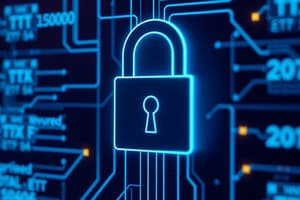Podcast
Questions and Answers
What are the two primary services provided by PGP?
What are the two primary services provided by PGP?
- Message integrity and confidentiality
- Digital signatures and certificate management
- Encryption and digital signatures (correct)
- Encryption and firewall protection
The digital signature created by PGP can be verified without any special keys.
The digital signature created by PGP can be verified without any special keys.
False (B)
Match the following protocols with their primary functionalities:
Match the following protocols with their primary functionalities:
PGP = Encryption and digital signatures PEM = Message integrity checking and originator authentication IPsec = Protocols to protect client protocols of IP RSA = Public key cryptography
What does ESP stand for in the context of IPsec?
What does ESP stand for in the context of IPsec?
In PGP, the algorithm used to produce a summary code for digital signatures is called __________.
In PGP, the algorithm used to produce a summary code for digital signatures is called __________.
Which part of PGP ensures that a message remains confidential during transmission?
Which part of PGP ensures that a message remains confidential during transmission?
IPsec can be used to provide key management requirements independent of the security protocol used.
IPsec can be used to provide key management requirements independent of the security protocol used.
What is the primary purpose of the Authentication Header (AH) in IPsec?
What is the primary purpose of the Authentication Header (AH) in IPsec?
What is the main purpose of Privacy-enhanced Electronic Mail (PEM)?
What is the main purpose of Privacy-enhanced Electronic Mail (PEM)?
An attacker can modify the message without the recipient detecting the change.
An attacker can modify the message without the recipient detecting the change.
What service aims to make a message unreadable except to the sender and recipient in PEM?
What service aims to make a message unreadable except to the sender and recipient in PEM?
The goal of the Internet Research Task Force on Privacy was to develop electronic mail protocols that would provide services such as __________.
The goal of the Internet Research Task Force on Privacy was to develop electronic mail protocols that would provide services such as __________.
Match the types of attacks with their corresponding impact on electronic mail security:
Match the types of attacks with their corresponding impact on electronic mail security:
What is one of the authentication issues in the electronic mail systems?
What is one of the authentication issues in the electronic mail systems?
The MTA (message transfer agent) only transfers messages to recipient hosts.
The MTA (message transfer agent) only transfers messages to recipient hosts.
What are the four types of attacks that make electronic mail nonsecure?
What are the four types of attacks that make electronic mail nonsecure?
What does IPsec provide at the IP layer?
What does IPsec provide at the IP layer?
Tunnel mode of IPsec is used when both endpoints support IPsec.
Tunnel mode of IPsec is used when both endpoints support IPsec.
What is a security gateway in the context of IPsec?
What is a security gateway in the context of IPsec?
IPsec operates in two modes: ______ mode and ______ mode.
IPsec operates in two modes: ______ mode and ______ mode.
What is the main purpose of the user agent (UA) in the message handling system?
What is the main purpose of the user agent (UA) in the message handling system?
Match the following terms with their definitions:
Match the following terms with their definitions:
The message transfer agent (MTA) is responsible for delivering messages to the user agent.
The message transfer agent (MTA) is responsible for delivering messages to the user agent.
Which IPsec mode is used for end-to-end communication?
Which IPsec mode is used for end-to-end communication?
IPsec provides mechanisms for replay detection.
IPsec provides mechanisms for replay detection.
What kind of key is generated by Alice in the symmetric cipher example?
What kind of key is generated by Alice in the symmetric cipher example?
In the example given, which host in Red Dog's network supports IPsec?
In the example given, which host in Red Dog's network supports IPsec?
In an asymmetric cipher, Alice uses her ______ key to decipher the message.
In an asymmetric cipher, Alice uses her ______ key to decipher the message.
Match the following components with their functions:
Match the following components with their functions:
Which principle states that the mail system should not need prearrangement?
Which principle states that the mail system should not need prearrangement?
All email systems must require prearrangement for effective encryption.
All email systems must require prearrangement for effective encryption.
What is a major problem related to Internet electronic mail mentioned in the content?
What is a major problem related to Internet electronic mail mentioned in the content?
Flashcards are hidden until you start studying
Study Notes
Network Security Concepts
- IPsec: A framework of protocols for securing Internet Protocol (IP) communications. It provides confidentiality, authentication, message integrity, and replay detection.
- Privacy Enhanced Mail (PEM): Ensures message integrity, origin authentication, and confidentiality through a secure electronic mail protocol.
- Pretty Good Privacy (PGP): Offers encryption for files and emails and digital signatures for verifying authenticity. Uses MD5 for hashing and RSA for encrypting the hash code.
PGP Functionalities
- Encryption: Encodes a message so only intended recipients can read it; interceptors see gibberish.
- Digital Signatures: Validates the integrity of a document. If altered, the signature is invalidated and can be verified using RSA.
IPsec Mechanisms
- Utilizes cryptographic techniques and key management requirements to provide security at the network layer.
- Adaptable to support different key distribution methods, including public key techniques and manual distribution.
IPsec Modes
- Transport Mode: Encrypts only the payload of an IP packet, leaving the IP header unprotected. Suitable for host-to-host communication.
- Tunnel Mode: Encapsulates the entire IP packet in an IPsec envelope, protecting both the payload and header. Ideal for secure communication when endpoints lack IPsec support.
Authentication and Key Management
- Key Exchange: The process of securely sharing encryption keys between parties.
- Key Management: Involves the administration of cryptographic keys, ensuring they are generated, distributed, stored, and retired securely.
Security Challenges
- Attacks on Email: Potential interception and modification of messages, resulting in breaches of confidentiality, authentication, and integrity.
- Nonrepudiation: The ability to prove that a sender did not deny sending a message. Lack of robust authentication can allow users to forge messages or deny sending them.
PEM Design Principles
- Services designed for acceptance and compatibility without requiring prearrangement or major changes to existing systems.
- Offers privacy enhancements that are optional for users, ensuring flexibility.
Basic Cipher Techniques
- Symmetric Key Cipher: Both sender and receiver use the same secret key for encryption and decryption.
- Asymmetric Key Cipher: Utilizes a pair of keys (public and private); the public key encrypts data, and the private key decrypts it.
Key Management Considerations
- A certificate-based scheme is vital for establishing trust in key exchanges.
- The specification of email protocols is complicated by character set limitations (e.g., ASCII vs. EBCDIC).
Real-World Examples
- Two companies using IPsec encapsulate messages in transport mode for secure communication.
- When a third party without IPsec needs access, the originating company may utilize tunnel mode to send protected packets through an appropriate gateway.
Studying That Suits You
Use AI to generate personalized quizzes and flashcards to suit your learning preferences.




